This Friday, 16th of September we will be joining the third annual AD4E festival – a whole day of change-making talks, presentations, conversations, and poetry from far and wide. You can read more about the online festival here and get your tickets at EventBrite.
Read on for more information about the guest speakers…
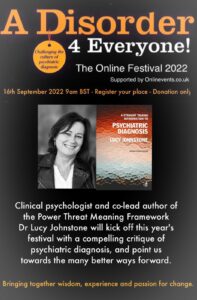
Dr Lucy Johnstone is a consultant clinical psychologist, and author of a number of books and publications taking a critical perspective on psychiatric theory and practice. She was lead author, along with Professor Mary Boyle, of the ‘Power Threat Meaning Framework’ (2018), a Division of Clinical Psychology-funded project to outline a conceptual alternative to psychiatric diagnosis. Lucy worked in Adult Mental Health settings for many years, and currently works as an independent trainer. She is a founding member of AD4E.
You can read Lucy’s posts on MITUK here and her work ‘Users and abusers of psychiatry: a critical look at psychiatric practice’, ‘A straight talking introduction to psychiatric diagnosis’, ‘A straight talking introduction to the Power Threat Meaning Framework

Dr Akima Thomas OBE is a feminist activist and comes from a background in nursing and social work. She is founder and Clinical Director of Women and Girls Network, a holistic therapeutic service working with women and girls surviving gendered violence. Akima has pioneered working from a trauma- informed approach and has developed a strengths-based non-pathologising clinical model, the Holistic Empowerment Recovery Model (HER), integrating healing of mind body and spirit. More recently Akima has researched women’s healing journey chronicling their strategies of resistance, rebellion and resilience to ensure survival.
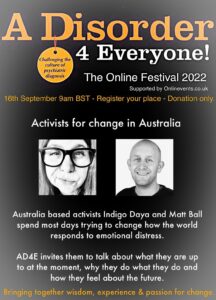
Indigo Daya has lived experience of childhood trauma, madness, and nine years of coercive psychiatric hospitalisations. She currently works as a survivor academic at the University of Melbourne, as a founding partner at Athena Consumer Workforce Consulting and as an independent survivor consultant, educator, supervisor. She is passionate about growing anti-oppressive, non-pathologising supports.
Indigo has worked in mental health and survivor advocacy for 17 years, moving around to try and find the best places and strategies to make change. She has been a peer support worker, community worker, founding manager of a hearing voices network, held advocacy, public policy and human rights roles, and been an advisor to the Royal Commission into Victoria’s Mental Health System. Indigo is also an artist and is considered the property of two senior, ginger rescue cats called Billy and Marche.
Matt Ball is a nurse practitioner, psychotherapist and founder of the Humane Clinic in Australia. Matt was born in the UK but has lived in Australia for over 20 years. In 2017 he was awarded Australian Mental Health Nurse of the Year. Matt speaks internationally on humane approaches to working with a person in distress. His work is driven by his own personal and professional experience, and he argues for direct alternatives to diagnosis-led mental health systems. He is uninterested in thinking about reforms and communicating with people who have guild and other interests in maintaining the status quo. He is interested to speak at AD4E as it is one of the few activist spaces in the world that has not sacrificed values for personal gain.
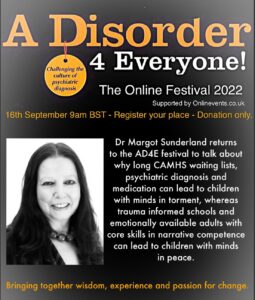
Dr Margot Sunderland is Director of Education and Training at the Centre for Child Mental Health London, Co- Director of Trauma Informed Schools UK, Honorary Visiting Fellow at London Metropolitan University, and a child psychotherapist with over thirty years’ experience of working with adults, children, teenagers. Margot is author of over twenty books in the field of child mental health, which have been translated into eighteen languages and published in twenty-four countries.
Dr Sunderland was a member of the Early Years Commission, Centre for Social Justice, Westminster and co- author of the cross party advisory report “The Next Generation” (early years intervention). She is also founder of the “Helping Where it Hurts” programme which offers free arts therapy to troubled children in Islington Primary schools. Margot’s internationally acclaimed book, ‘The Science of Parenting’ won First Prize in the British Medical Association Medical Book awards 2007 Popular Medicine section. (Paperback version titled ‘What Every Parent Needs to Know’). Dr Sunderland makes TV and radio appearances as a child and parenting expert. Overall, she is concerned to ensure that parents, teachers and mental health professionals alike, are offered the most up to date psychological and brain science research on how children and young people can be enabled to thrive. She is passionate about social change for a kinder, warmer world.
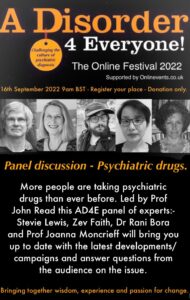
John Read is Professor of Clinical Psychology at the University of East London. As well as having worked in mental health services, he has edited and authored several books, including ‘Models of Madness’. He has published over 180 research papers, primarily on the relationship between adverse life events and psychosis. He also researches the negative effects of bio-genetic causal explanations on prejudice, the experiences of recipients of anti-psychotic and anti-depressant medication, electroconvulsive therapy, and the role of the pharmaceutical industry in mental health research and practice.
John is Chair of the International Institute for Psychiatric Drug Withdrawal, and on the Board of the Hearing Voices Network, England. He has been the Editor of the journal ‘Psychosis’ for 12 years and was recently made an Honorary Life Member of the International Society for Psychological and Social Approaches to Psychosis.
Joanna Moncrieff is Professor of Critical and Social Psychiatry at University College London, and a consultant psychiatrist at the North East London Foundation Trust. She is one of the founders and the co-chair of the Critical Psychiatry Network. Her research concerns a critique of mainstream views about psychiatric drugs. She also writes about the history of drug treatment and about the history, politics and philosophy of psychiatry more generally. She is currently leading UK government-funded research on reducing and discontinuing antipsychotic drug treatment and collaborating on a study to support antidepressant discontinuation.
Joanna is the author of numerous papers and several books, including ‘The Myth of the Chemical Cure’ (2009) and ‘The Bitterest Pills: the troubling story of antipsychotic drugs’ (2013). Joanna was lead author of the recent review concluding that there is no evidence for the ‘chemical imbalance’ theory of depression, which made headlines round the world. You can read Joanna’s posts on MITUK here.
Stevie Lewis is a UK based campaigner and board member of the International Institute for Psychiatric Drug Withdrawal. Most recently, she has co-presented with Dr Mark Horowitz a training video for prescribers and the public entitled ‘Antidepressant Withdrawal Syndrome and Its Management’.
She is a co-author of ‘The Patient Voice: patients who experience antidepressant withdrawal symptoms are often dismissed, or misdiagnosed with relapse, or a new medical condition’ (Therapeutic Advances in Pharmacology, 2020). The original research for this paper was an analysis on behalf of the Westminster All Party Parliamentary Group for Prescribed Drug Dependence of the stories written by people of their experiences of prescribed drug dependence, which had been submitted as evidence to public petitions raised in Wales and Scotland. The resulting analysis was submitted as evidence to the 2019 Public Health England review of prescribed drug dependence.
Stevie is a member of the Withdrawal Services Working Group convened to define patient needs for the implementation of PHE’s recommendations for action. She is the author of an article ‘Four research papers I wish my GP had read before prescribing antidepressants’ published in the British Journal of General Practice in 2021.
Z’ev Faith is a Mad/Disabled, Queer, Transsexual, psychiatric survivor and activist, Anti-Psychiatry Anarcho-Anti-folk Singer/Songwriter, Mad Scholar with an MSc in Creative Arts and Mental Health, Interdisciplinary Affect Artist specialising in Performance/Live Art rooted in themes of alienation, social injustice, anti-capitalism, the psychiatric industrial complex, queer identity and emotional exhibitionism.
Dr Rani Bora is a private holistic psychiatrist, wellness coach and speaker, and the author of a self-published book – ‘How To Turn Stress On Its Head’. She has studied and trained in a number of integrative wellbeing and coaching approaches. Her passion is prevention of mental ill-health through ‘mental wealth’ coaching and lifestyle changes and is a strong advocate for empowering patients, peer support and personal recovery. She has a special interest in de-prescribing. She brings her coaching expertise and knowledge into her clinical practice.
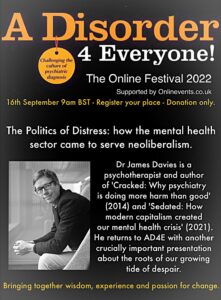
Dr James Davies holds a PhD in medical anthropology from the University of Oxford. He is a practising psychotherapist and a Reader in anthropology and psychology at the University of Roehampton, London. He is the co-founder of the Council for Evidence-based Psychiatry, now secretariat to the All-Party Parliamentary Group for Prescribed Drug Dependence. He has published several books, including ’Cracked: why psychiatry is doing more harm than good’, and ‘Sedated: how modern capitalism created our mental health crisis’.
Read more of James’ posts on MITUK here
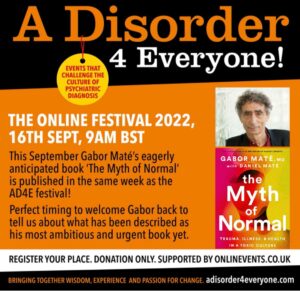
Dr Gabor Maté is a retired physician who, after 20 years of family practice and palliative care experience, worked for over a decade in Vancouver’s Downtown East Side with patients challenged by drug addiction and mental illness. He is a bestselling author of four books published in thirty languages, including the award-winning ‘In the Realm of Hungry Ghosts: Close Encounters with Addiction’. He is also an internationally-renowned speaker highly sought after for his expertise on addiction, trauma, childhood development, and the relationship of stress and illness. For his groundbreaking medical work and writing he has been awarded the Order of Canada, his country’s highest civilian distinction, and the Civic Merit Award from his hometown, Vancouver. His fifth book, ‘The Myth of Normal: Trauma, Illness and Healing in a Toxic Culture’ was released on September 13, 2022. To learn more, join his e-news list at www.drgabormate.com.
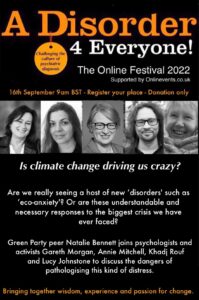 Natalie Bennett (or Baroness Bennett of Manor Castle for really formal occasions) became the second Green Party member of the House of Lords in 2019, since when she has worked often on health issues, including the Medicines and Medical Devices Act, the Health and Social Care Act, as well as on the Environment Act, and she’s now deep in the Energy Bill, which started in the House of Lords. Her first degree was in Agricultural Science, but she spent most of her career as a journalist, finishing as editor of the Guardian Weekly, after four years in Bangkok, including as a volunteer with the Thai National Commission on Women’s Affairs, reflecting her first politics as a feminist.
Natalie Bennett (or Baroness Bennett of Manor Castle for really formal occasions) became the second Green Party member of the House of Lords in 2019, since when she has worked often on health issues, including the Medicines and Medical Devices Act, the Health and Social Care Act, as well as on the Environment Act, and she’s now deep in the Energy Bill, which started in the House of Lords. Her first degree was in Agricultural Science, but she spent most of her career as a journalist, finishing as editor of the Guardian Weekly, after four years in Bangkok, including as a volunteer with the Thai National Commission on Women’s Affairs, reflecting her first politics as a feminist.
Annie Mitchell is a grandmother, psychologist, Playback Theatre performer and psychotherapist who grew up in a mining community in County Durham. She tries to make connections between community and clinical psychology, climate and the environment, health, and our various troubles – and joys – of birth, death, and life. Annie has been clinical director of training programmes in clinical psychology at Exeter and Plymouth and remains enthusiastic about helping learners from all backgrounds to stay human(e). Twitter: @annieingarden
Dr Khadj Rouf is a Consultant Clinical Psychologist with professional and personal interests in safeguarding, trauma-informed care and the impact of trauma on mental health. She works in the NHS. You can read more of Khadj’s work in The Lancet on Planetary Health Vol 4, 4, e124 – e167, April 2020, Is there justice for trauma survivors? and Do words help?
Dr Gareth Morgan is a clinical psychologist and lecturer on the Leicester Clinical Psychology training programme, having previously worked clinically in learning dis/ability and adult mental health services. He is co-chair for ACP’s Climate Action Network and member of the Group of Trainers in Clinical Psychology’s Planetary Health sub-committee. Gareth has been a supporter of AD4E events for a number of years. Recently he co-authored a paper arguing for non-pathologising understandings to various reactions to the climate & ecological emergencies.
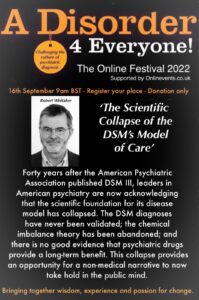
Robert Whitaker is a science journalist and the author of two books about the history of psychiatry, ‘Anatomy of an Epidemic’ (2011) and ‘Mad in America’ (2019). He is president of the Mad in America Foundation, a non-profit organization that publishes madinamerica.com, with affiliate websites in 11 countries.
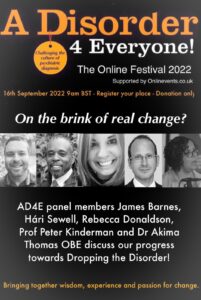
Peter Kinderman is Professor of Clinical Psychology at the University of Liverpool, studying the psychological and social determinants of mental health. He is a practising Clinical Psychologist, Clinical Advisor at Public Health England, and former President of the British Psychological Society.
He is the author of various journal articles and book chapters, as well as “A Prescription for Psychiatry” (2014), “New Laws of Psychology” (Little, Brown, 2015), and “A Manifesto for Mental Health” (2019). He has received many research grants, and acts as a Clinical Advisor for Public Health England. You can read Peter’s posts on MITUK here. He is on Twitter @peterkinderman. His research profile can be found here: http://orcid.org/0000-0001-8972-8548
Hári Sewell is a writer and speaker in his specialist area of social justice, equality, race and culture in mental health. Hári is honorary Senior Visiting Fellow at the University of Central Lancashire and Specialist Guest Lecturer at University of Bradford, Visiting Lecturer at Christ Church Canterbury University and is a Member of the Scientific Board of the ESRC Centre for Society and Mental Health. Hári is a proud member of the Board of Trustees at the British Association of Social Workers. www.hsconsultancy.org.uk
James Barnes is a psychotherapist, lecturer and writer, with a background in post-Freudian psychoanalysis and philosophy. His core interests are in relational, intersubjective models of the psyche and the de-medicalising of emotional and psychological distress. He has a psychotherapy practice in Exeter, UK, and works with clients remotely. He is currently writing a book on the ‘relational psyche’ for Confer Books.
Rebecca Donaldson is a confessional poet and a doctoral student in Positive Developmental Psychology at Claremont Graduate University in Southern California. Her research interests include adverse childhood experiences, narrative identity, and exploring ways to support individuals with histories of complex trauma through the lens of Urie Bronfenbrenner’s bio-ecological model. She is passionate about alloparenting and mentorship and serves as a mentor for high school students wishing to attend college. Outside of academics, Rebecca writes and performs poetry about the harm frequently done by the mental health system to adults with histories of childhood trauma. She detests the label of ‘borderline personality disorder,’ and argues that Dialectical Behavioral Therapy (DBT) is inappropriate for survivors of childhood abuse and neglect. For her, writing is a medium of self-expression in which she can be open, honest, and reflective about the mud in her life and the flowers which have grown from it. She attempts to be raw with the world as she is with her friends and disowns all labels of mental illness. Her writings have been published by Mad in America, The Psychologist, The Peace Chronicles, and The Young Invincibles. Her first collection of poems, “Mad Women” was published this year.
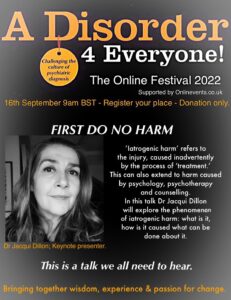
Dr Jacqui Dillon is an activist, author, and speaker, and has lectured and published worldwide on trauma, abuse, hearing voices, psychosis, dissociation, and healing. She is a key figure in the international Hearing Voices Movement, has co-edited three books, published numerous articles and papers and is on the editorial board of the journal ‘Psychosis.’ Jacqui is Honorary Lecturer in Clinical Psychology at the University of East London, Visiting Research Fellow at The Centre for Community Mental Health, Birmingham City University and a member of the Advisory Board, The Collaborating Centre for Values-Based Practice in Health and Social Care, St Catherine’s College, Oxford University. Jacqui’s survival of childhood abuse and subsequent experiences of using psychiatric services inform her work, and she is an outspoken advocate and campaigner for trauma informed approaches to madness and distress. Jacqui is part of a collective voice demanding a radical shift in the way we understand and respond to experiences currently defined as psychiatric illnesses. In 2017, Jacqui was awarded an Honorary Doctorate of Psychology by the University of East London. www.jacquidillon.org
Read more about the online festival here and get your tickets at EventBrite.
